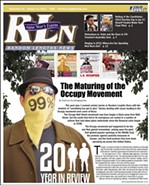How Far Does Bush Spying Go?
At issue was whether we have a president or a king. At least that’s how Senator Russ Feingold (D-WI) saw the investigation into the Bush Administration’s secret warrantless wiretapping program, which the Senate Judiciary Committee took up on Feb. 5 by calling Attorney General Alberto Gonzales as its first witness.
Countering Karl Rove’s line that critics have "a pre 9-11 view of the world." Feingold said "the president seems to have a pre-1776 view of the world. That's the problem here."
“Our forefathers fought a revolution ––a revolution–– to be free from rulers who put themselves above the law,” Feingold said. “And I’ve got to say, Mr. Chairman, I think this administration has been violating the law and is misleading the American people to try to justify it.”
Thomas Powers, author of several books on intelligence agencies, said that more important than the question of illegality was the question of the program’s scope, which he said was probably a vast data-mining operation. While it’s been reported that thousands of names have been generated by the program—yielding only to a handful of leads he said that “They’ve probably been culled from tens of thousands or twenties of thousands of names.”
Senator Dianne Feinstein read off a list of changes made to the Foreign Intelligence Surveillance Act (FISA)—expanding the scope, lowering standards, expanding time frames, etc.—and then concluded, “Now, in view of the changes that we have made, I cannot understand why you didn't come to the committee unless the program was much broader and you believed it would not be authorized... I can only believe––and this is my honest view––that this program is much bigger and much broader than you want anyone to know.”
Powers said that scope was no indication of effectiveness. The Administration was “falling back on technical fixes for what are actually political problems,” he said.
The NSA can easily spy on all the Americans it wants. But, Powers said, “What they can’t do is train an army to speak Arabic,” which would actually yield useful information.
While Democratic Senators tried to lay the groundwork for further investigation, Republicans were only occasionally with them.
From the beginning, the Judiciary Committee investigation looked more like a cover-up. First, Republicans voted not to swear in Gonzales, who testified misleadingly during his confirmation hearing in January 2005, giving the appearance that no such program was in place. Not swearing him in could protect him from a perjury indictment.
However, former federal prosecutor Elizabeth de la Vega said the Republicans had not really protected him.
“He could be charged with fraud,” she said.
As the day wore on, several Republican Senators were critical of the Administration, but some threw Gonzales softballs, while others took batting practice for him—urging a vigorous prosecution of those who leaked word about the secret wiretaps.
Senator Grassley (R-IA) was the Administration’s point man. He first questioned what was being done to investigate the leak and prosecute those involved. He went on to call the Bush Administration’s exposure of CIA agent Valerie Plame “a two-bit nothing compared to this sort of issue.”
But Senator Joe Biden (D-DE) later ridiculed the notion that al Qaeda didn’t know it was being spied on.
“I hope they're that stupid,” Biden said.
By the end of the week, it was clear that the Administration was going all out to investigate the leak and intimidate potential witnesses regarding the Administration’s criminal misconduct.
According to The New York Times, “Federal agents have interviewed officials at several of the country's law enforcement and national security agencies in a rapidly expanding criminal investigation.”







